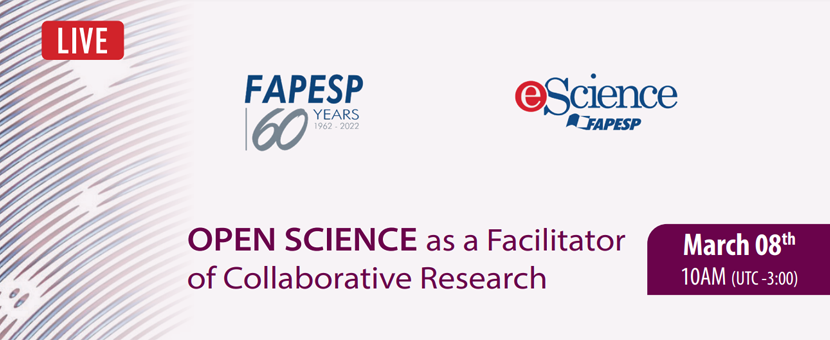Events
Open Science as a Facilitator of Collaborative Research Webinar

The Open Science (OS) movement is growing all over the world. It has been recognized as a key factor in the advancement of collaborative research and sharing of information for the benefit of science and society. OS is based on the principle that all aspects of a research effort, including publications, data, software, evaluation processes, hardware specifications, and others, should be open to all citizens and subject to ethical and legal constraints. This has raised the concept of “as open as possible, as closed as necessary” and has highlighted the urgent need for new policies, new research practices, and computing infrastructure to support OS implementation.
This webinar aims to raise awareness, among researchers and policy-makers, of OS policies at FAPESP and initiatives by the European Commission and the OECD to foster OS. The panel will discuss some of its benefits and challenges and the implications of OS to multinational research collaborations.
| Moderators | Claudia Bauzer Medeiros Steering Committees for Special Programs - FAPESP, Research Program on eScience and Data Science |
| Co-moderators | José Roberto de França Arruda Adjunt Panel - Special Programs and Collaboration in Research – FAPESP Eduardo Cesar Leão Marques Steering Committees for Special Programs – FAPESP, Research Program on eScience and Data Science |
PROGRAM (UTC-3:00)
| 10:00 |
Opening |
| 10:10 |
Open science and FAPESP initiatives |
| 10:30 |
Open Science: from policies and practices to opportunities and challenges |
| 10:50 |
European Commission Open Science Strategy and Initiatives |
| 11:10 |
Questions and Answers |
| 12:00 |
Closing |
OPEN SCIENCE
The Open Science movement is growing all over the world, being subject to policies, recommendations and legislations of many supra-national institutions. It is based on the principle that all processes and objects involved in a research initiative should be open to all citizens, including publications, data, software, evaluation processes, hardware specifications and others, subject to ethical and legal constraints. This has raised the notion of "as open as possible, as closed as necessary" and the need for new policies and computing infrastructure to support its implementation, as well as the development of new research practices, towards openness.
FAPESP is one of the pioneer Latin American funders in launching initiatives related to Open Science. It has been continuously defining policies and creating mechanisms to support them - through norms, programs, and actions in many fields.
An OECD recommendation on Enhancing access to research data from public funding in 2006 was instrumental in attracting policy attention to this area. A revised version of this recommendation was approved in January, 2021 that made reference not only to data but also to software and other digital objects.
For more than 10 years, the European Commission has also supported and launched Open Science initiatives. A major initiative is the European Open Science Cloud, which aims to provide an integrated computing platform so that all researchers that work at member countries can deposit publications, data, software and other research outputs, to be shared with the world.
Open science was recognized by UNESCO through official recommendations, in November 2021, as an important factor to advance scientific collaborations and the sharing of information "for the benefit of science and society".
The goal of this webinar is to raise awareness, among researchers and policy-makers, of Open Science policies at FAPESP and initiatives by the European Commission and the OECD to foster Open Science. The panel will discuss some of its advantages and challenges, and implications to multinational research collaborations.
The webinar will be in English without simultaneous translation.
Joint the Webinar sending questions to: escience@fapesp.br (the questions will be answered during the event)
See more about FAPESP eScience and Data Science Program: https://fapesp.br/en/escience
No declaration of presence or certificate will be issued for the broadcasted events.

